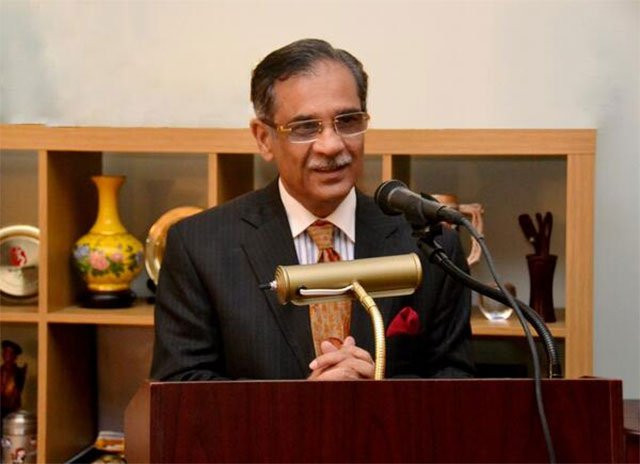There is a need to revamp judicial system: CJP
Issues notices to federal govt on a petition seeking improvement in administration of justice

CJP Mian Saqib Nisar. PHOTO: EXPRESS
Justice Nisar, heading a three-judge bench, made these remarks on Monday while hearing a constitutional petition seeking the apex court’s directions for improving the capacity and performance of administration of justice.
The petition was moved by five young lawyers – Umer Gilani, Hadiya Aziz, Muhammad Haider Imtiaz, Attaullah Hakim Kundi and Raheel Ahmed – under Article 184(3) of the Constitution, nominating as respondents all registrars of high courts, the federal government, provincial governments and others.
LHC summons PEMRA official over Nawaz, Maryam anti-judiciary speeches
During the hearing, the bench appreciated the petitioners for drafting a good petition and highlighting important issues in it, adding that it is true public interest litigation. The court, however, gave option to petitioners either to delete the respondent departments which fall under the CJP or fix their case before another bench for hearing.
Gilani told the bench that they are willing to delete those respondent departments which are under the administration of the chief justice. The hearing of case was later adjourned for two weeks.
The petitioners submitted that being the citizens of Pakistan and legal practitioners enrolled under the Legal Practitioners and Bar Councils Act, 1973, they are personally aggrieved by the lack of enforcement of the fundamental right of access to justice which is the subject matter of their petition.
As members of the legal profession, they are aggrieved by the loss of reputation of judicial system in the eyes of the people of Pakistan as the loss is a direct result of the lack of acts and omissions.
The petition said access to justice must be considered a fundamental right because it is an essential corollary of all the rights granted under the Constitution.
It said studies by eminent social scientists provided evidence that “at present the right of access to justice is being violated in Pakistan in a systematic manner, and all kinds of litigants, seeking enforcement of their rights through courts, face inordinate delays that cannot be reasonably predicted”.
The World Justice Index – a scientific study of 113 countries carried out by a worldwide network of independent researchers – has ranked Pakistan at 106 in terms of Access to Justice.
The World Bank (WB) Ease of Doing Business Survey is a study of more than 190 countries of the world which ranks Pakistan at 147. According to the WB study, the average time taken for enforcement of a contract in the business sector is more than 1,096 days in Karachi and 1,025 days in Lahore – almost three years, says the petition.
Under the guidance of the former CJP Justice (retd) Jawwad S Khawaja, it was determined that in a case where the parties chose to avail all legal remedies up to the Supreme Court level, it took an average of 25 years to conclude litigation, it said.
PM slams judiciary for labelling MPs ‘thieves and looters’
The petition said under Article 37(d) of the Constitution, it is the responsibility of each and every organ of the state to ensure delivery of “inexpensive and expeditious justice” to all citizens.
But, from the general scheme of the 1973 Constitution, it appears that the primary responsibility of enforcing the fundamental right of access to justice is that of “the Judicature” – the organ of state defined in Part VII of the Constitution.
“In other words, the primary responsibility for ensuring access to justice falls upon, inter alia, Supreme Court of Pakistan, the high courts, the courts established through laws enacted in pursuance of Article 175 and the tribunals established through law enacted under Article 212 of the Constitution,” it said.
“Under Article 203 of the Constitution, it is the duty or obligation of high courts to supervise and control all courts subordinate to [them]. It is relevant to highlight that the word used in Article 203 is ‘shall’ which indicates a job that must be performed.
“When Article 203 is read together with Article 37(d), it is clear that the high courts are constitutionally bound to take all such steps as are necessary for ensuring that the courts subordinate to them are dispensing inexpensive and expeditious justice,” it said.



















COMMENTS
Comments are moderated and generally will be posted if they are on-topic and not abusive.
For more information, please see our Comments FAQ